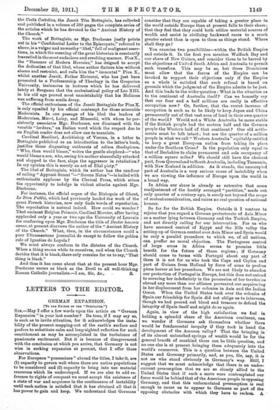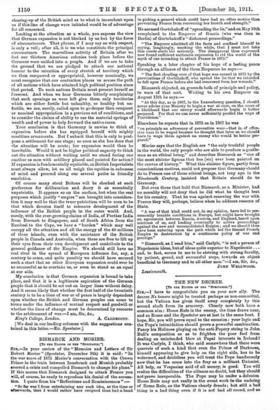LETTERS TO THE EDITOR.
GERMAN EXPANSION.
pro TRY EDITOR OT THR " Srscr.vroz."1 Sra,—May I offer a few words upon the article on " German Expansion " in your last number? Its tone, if I may say so, is such as to invite attention, for it acknowledges the insta- bility of the present mapping-out of the earth's surface and prefers to substitute calm and long-sighted reflection for such resettlement as may be accomplished in the turbulence of passionate excitement. But it is because of disagreement with the conclusion at which you arrive, that Germany is not wise in seeking expansion at present, that I offer these observations.
For European "possessions " abroad the titles, I take it, are (1) capacity to govern well where there are native populations to be considered and (2) capacity to bring into use material resources which lie undeveloped. If we are also to add re- ference to rights of conquest we must accept the existence of a state of war and acquiesce in the continuance of instability until each nation is satisfied that it has obtained all that it has power to gain and keep. We understand that Germans consider that they are capable of taking a greater place in the world outside Europe than at present falls to their share ; that they feel that they could both utilize material sources of wealth and assist in civilizing backward races to a much greater extent than is open to them as things stand. Where shall they go ?
You examine two possibilities—within the British Empire and outside it. In the first you mention Walfisch Bay and our share of New Guinea, and consider these to be barred by the objections of United South Africa and Australia to permit such transfers. This may be so, but these Dominions must allow that the forces of the Empire can be invoked to support their objections only if the Empire as a whole is satisfied that such refusal is based on grounds which the judgment of the Empire admits to be just. And this leads to the wider question : What is the situation as to the continent of Australia itself ? Can we honestly say that our four and a half millions are really in effective occupation now ? Or, further, that the recent increase of occupation is such as to be likely to keep Japan and China permanently out of that vast area of land in their own quarter of the world ? Would not a White Australia be more stable if the British people bad the eastern half and the German people the Western half of that continent P Our old settle- ments must be left intact ; but are the quarter of a million people in what we call " Western Australia" equitably entitled to keep a great European nation from taking its place under the Southern Cross ? Is the population only equal to that of Berkshire to claim permanent and sole occupancy of a million square miles ? We should still have the choicest part, from Queensland to South Australia, including Tasmania, with New Zealand in addition. As it stands, the unoccupied part of Australia is a very serious cause of instability when we are viewing the influence of Europe _upon the world in a broad way.
In Africa our share is already so extensive that some readjustment of the hastily arranged "partition," made out only quarter of a century ago, is surely not beyond the scope of mutual consideration, and raises no real question of national honour.
So far for the British Empire. Outside it I venture to rejoice that you regard a. German protectorate of Asia Minor as a matter lying between Germany and the Turkish Empire, and not directly calling for our intervention. For us who have assumed control of Egypt and the Nile valley the setting-up of German control over Asia Minor and Syria would be only a parallel procedure to which we, of all nations, can proffer no moral objection. The Portuguese control of large areas in Africa seems to promise little benefit for the future of those regions ; if Germany should come to terms with Portugal about any part of them it is not for us who took the Cape and Ceylon and part of Guiana from Holland by force of arms to profess pious horror at her procedure. We are not likely to abandon our protection of Portugal in Europe, but this does not extend to securing her indefinitely in the possession of her territories abroad any more than our alliance prevented our acquiescing in her displacement from her colonies in Asia and the Indian Ocean. When the United States took over the colonies of Spain our friendship for Spain did not oblige us to intervene, though we had poured out blood and treasure to defend the integrity of Spain itself and might do so again.
Again, in view of the high satisfaction we feel in holding a splendid share of the American continent, can we wonder if Germans ask themselves whether there would be fundamental inequity if they took in hand the development of the Amazon valley ? That the bringing in of its almost untouched springs of wealth would be for the general benefit of mankind there can be little question, and no one else is at present ,bringing them adequately into the world's commerce. This is a question between the United States and Germany primarily, and, as you, Sir, say, it is not ws who stand obviously in Germany's way. Still, I suggest that we must acknowledge that there is an under- current presumption that we are so closely allied to the United States that if such a move were contemplated our force would be behind that of the American people in opposing Germany, and that this unformulated presumption is real enough to cause us to appear to Germans as part of the opposing obstacles with which they have to reckon. A.
clearing-up of the British mind as to what is incumbent upon us if this line of change were initiated would be of advantage for all concerned.
Looking at the situation as a whole, you express the view that German expansion is not blocked by us but by the force of circumstances. That phrase, if I may say so with respect, is only a veil; after all, it is we who constitute the principal circumstance. The marvellous activity of Britain after we lost our thirteen American colonies took place before the Germans were unified into a people. And if we are to take the ground that we are pledged to attach our national honour to the retention of every stretch of territory which we then conquered or appropriated, however nominally, we must recognize that our contention places us across the path of all nations which have attained high political position since that period. To such nations Britain must present herself as l'ennemi. And when we hear Germans bitterly complaining that such openings as were left give them only territories which are either fertile but unhealthy, or healthy but un- fertile, we are, surely, called upon to go deeper than conquest or nominal appropriation in a previous set of conditions, and to consider the claims of ability to use the material springs of wealth and of power to help forward the native races.
Your conclusion is that Germany is unwise to think of expansion before she has equipped herself with mighty maritime armaments. But I submit that this is only to post- pone a settlement for one stage; so soon as she has done that the situation will be acute ; her expansion would then be inevitable. Would it not be higher political sagacity to think out the situation without waiting until we stand facing one another as men with artillery placed and pointed for action ? If expansion is fundamentally equitable, as British Imperialists must always allow, let us all weigh the equities in calmness of mind and proceed along our several paths in friendly emulation.
Of course many stout Britons will be shocked at such preference for deliberation and decry it as essentially unpatriotic. It appears so on the surface, but when the real purposes which justify " empire " are brought into considera- tion it may well be that the truer patriotism will be seen to be that which devotes itself to intensive development of the influence of the British people in the outer world. And, surely, with the ever-growing claims of India, of Further India from Burmah to Singapore, and of South Africa from the Zambesi to the Cape, we have a "burden" which may well occupy all the attention and all the energy of the 40 millions of these islands, even with the assistance of the British people in Canada and Australia, when these are free to lift up their eyes from their own development and contribute to the general guidance of the Empire. We should still have no real rival in the spread of European influence for, say, a century to come, and quite possibly we should have secured such a start that no other European expansion could ever be so successful as to overtake us, or even to stand as an equal at our side.
My conclusion is that German expansion is bound to take place, and that it is a legitimate aspiration of the German people that it should be set out on larger lines without delay. And it seems likely that whether the first half of the twentieth century is to be a time of war or of peace is largely dependent upon whether the British and German peoples can come to terms under the influence of mutual respect and goodwill or whether the lines of change must be determined by recourse to the arbitrament of war.—I am, Sir, &c.,
King's College, London. A. CILDBCOTT. [We deal in our leading columns with the suggestions con- tained in this letter.—En. Spectator.]







































 Previous page
Previous page